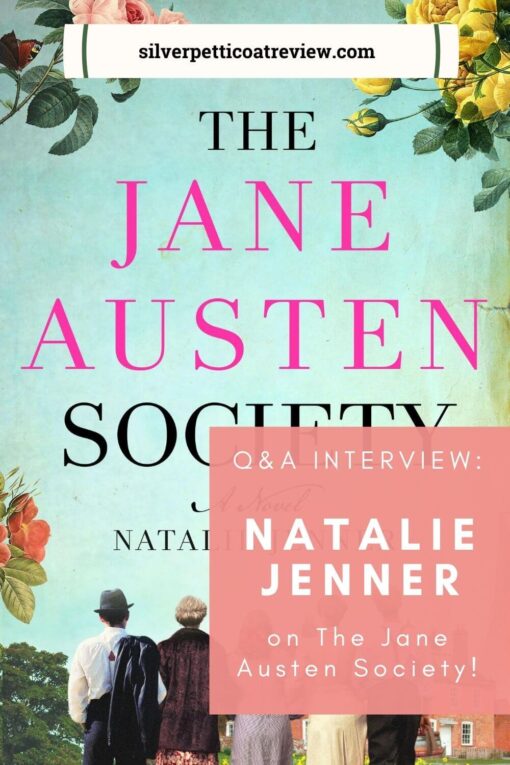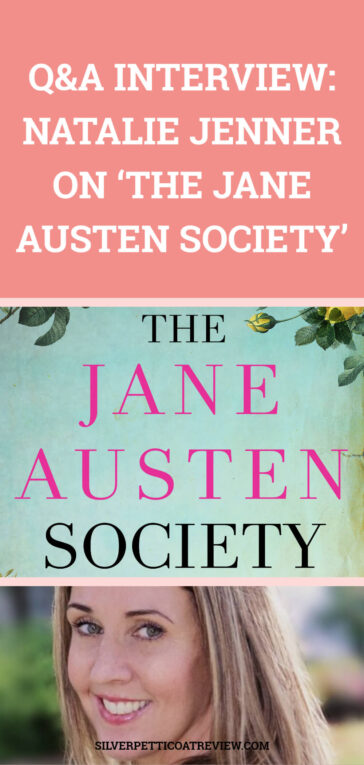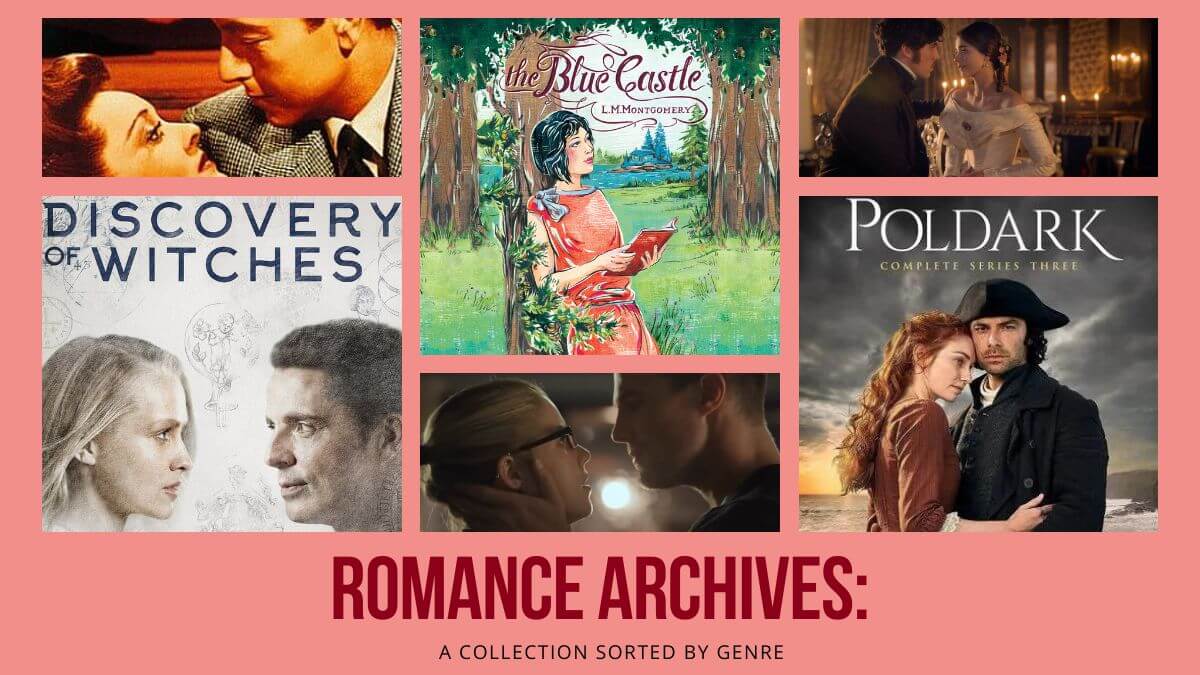Natalie Jenner, the author of The Jane Austen Society, answers fan’s questions for The Silver Petticoat Book Club.
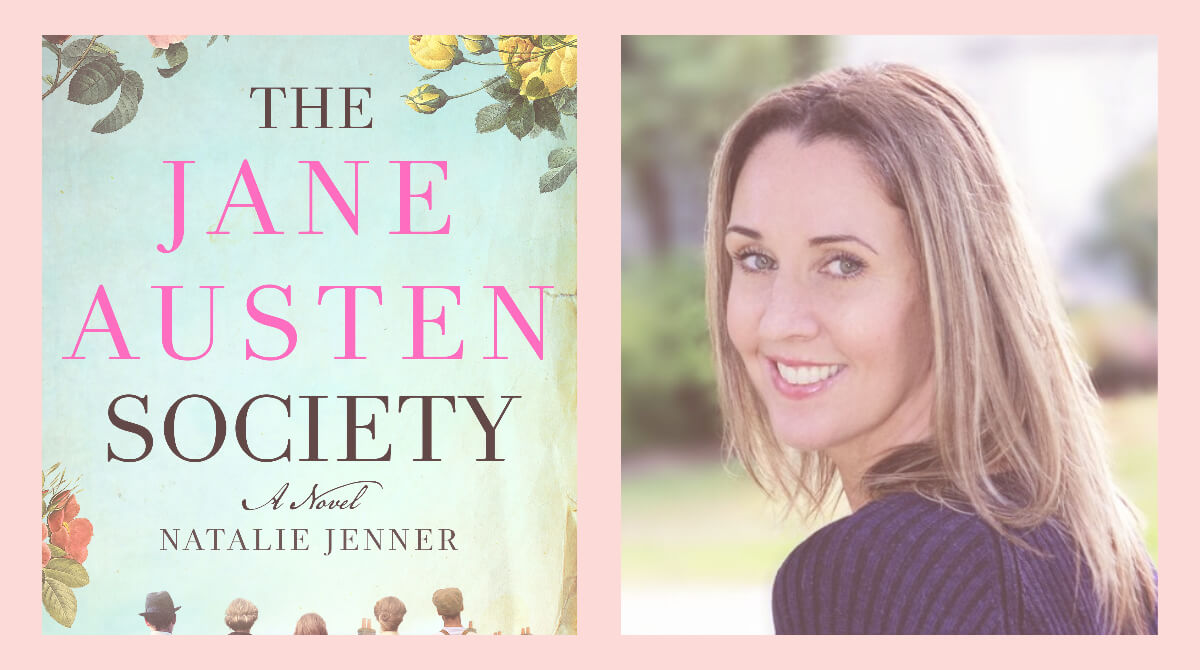
If you’ve been following our brand-new Silver Petticoat Book Club, you’d know our first book club pick is The Jane Austen Society by Natalie Jenner!
It’s a brilliant new historical fiction book about Jane Austen fans coming together in the 1940s to preserve Austen’s legacy and her Chawton home. It’s an uplifting book that pays tribute to Austen’s beloved novels while also telling a unique story. If you haven’t read it yet, consider adding it to your reading list.
For the book club, Natalie Jenner graciously agreed to do a Q&A with the readers. So, I gathered up some fan’s questions from the book club group and turned them over to Natalie with a couple of additional questions. So, here you go!
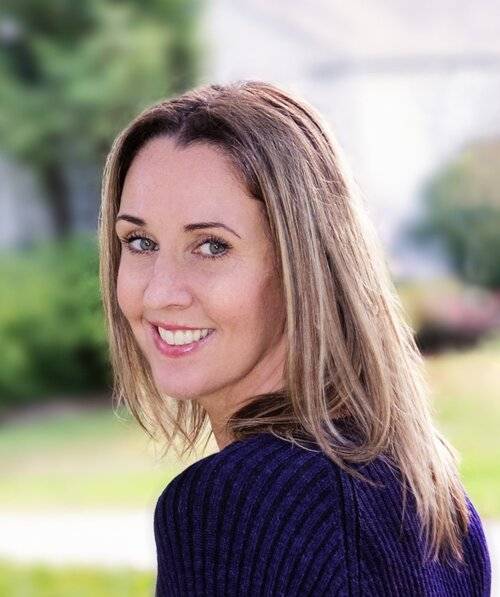
AMBER TOPPING: Who (or what) motivated you to become a writer? Have you always wanted to be a writer?
NATALIE JENNER: I don’t remember ever not wanting to be a writer. My mother says that even before I could read, as young as 2 or 3, I traipsed about the house with a little pencil in my hand and would pretend to scribble down musings. I was that kid. My mum put together my first book for me when I was eight, with a front and back cover held together by string and those little seals for punched holes in paper. And my father would always come back from business trips with books for me, including each of the seven Anne of Green Gables series and a wonderful Austen anthology, all of which I still own and treasure. Both my parents thoroughly encouraged and supported me in whatever I did.
The other key formative influence on my writing has been my English teachers and university professors over the years, each of whom I thank in the acknowledgements to my book. In fact, getting this book published gave me a great excuse to reach out to each of them where possible, and they are all so thrilled for me. I think every writer knows, it’s really the teachers on this one that make the difference. Your family may always love (or have no interest!) in what you write, but teachers are the ones whose encouragement really carries weight and powers you through the years of rejection.
It took you a long time to get published. How did you cope with the disappointment or discouragement while you kept moving forward?
The wall of agents’ and publishers’ silence that met my first five books was always extremely disappointing to me, but I never let it interfere with the writing itself. It was actually easy to compartmentalize like that, because I only ever write when I feel like it, and because writing honestly was, and still is, the most fun I’ve ever had. Writing can be hard and exacting work, and it requires commitment and diligence, but in the end, everything about this journey is wonderful if you keep finding the fun in creating imaginary worlds.
Did you model your characters in the book on specific Austen characters? The fans want to know who your inspiration was for each of the characters!
As I describe below, my characters appear to me fully formed on the page when they first show up. But as I wrote, I discovered the opportunity to create intentional parallels with Austen’s works, based on how the characters were already relating to each other, especially romantically, and sometimes within their first scene together. From that point on, I had so much fun filling in backstory or creating behaviour and dialogue that called to mind specific characters from Austen’s pages.
To that end, the age difference and socially inappropriate nature of any romantic relationship between Dr. Gray and Adeline reminded me of Mr. Knightley and Emma, while their tension/suspicion around each other, mutual pride, and sparring reflects Darcy and Elizabeth. The character of Frances Knight is inspired by both Fanny Price from Mansfield Park for her patience and pragmatic resignation, and Anne Elliot in Persuasion for her regretful bending to the will of her family as a young woman.
The comic character of Liberty Pascal is based on the Steele sisters in Sense and Sensibility. Mimi Harrison and Jack Leonard’s relationship contains elements of both the siblings Mary and Henry Crawford from Mansfield Park, Lizzie Bennet and Mr. Darcy in Pride and Prejudice, and Marianne and Willoughby in Sense and Sensibility, especially when it comes to themes of the power of physical attractiveness and seduction. Adam Berwick’s last name is a play on Captain Benwick from Persuasion, the grief-stricken sailor who lost his fiancée presumably to illness while away at sea. These are just some of the parallels, and the only ones I can share without spoiling some of the plot twists!
What real facts either about Jane Austen or the real Jane Austen Society inspired you the most?
I was so inspired by Austen’s commitment to her craft at a time when “lady authors” were published anonymously: by how she rigorously worked over her manuscripts, corresponded directly with publishers (some of whom had never published a woman before!), loved getting feedback on her work from her family, and kept writing even during periods of chronic ill health, income insecurity, and pain.
In terms of the real Jane Austen Society, I was so impressed by how in 1940 a local woman, Dorothy Darnell, saw an old piece of fire grate lying as rubbish by the side of the main Chawton road and decided that Austen’s legacy and home needed to be saved and preserved somehow. Darnell gathered together a handful of other similarly inclined souls, and they met in her front parlour in May 1940 (exactly 80 years ago) to form the first Jane Austen Society in the world. But because WWII was raging, funds were scarce and they were unable to raise enough money through newspaper advertisements and the like to purchase the cottage and turn it into a museum.
Then in 1948, a grieving father and Austen fan, T. E. Carpenter, who had lost his son in battle during the war, purchased the cottage outright and donated it to the nation. A trust was formed, and the Jane Austen Society worked with the trust to open the museum in 1949 (last summer was the 70th celebration of its own founding). So, a lot of anniversaries going on, which makes things extra poignant for me with my book.
Have you begun any negotiations for a film adaptation of The Jane Austen Society? The fans would love to see your book on the screen!
Hollywood definitely works on its own clock—things in that industry happen both very quickly, and very slowly, sometimes at the exact same time! So although right now we are fielding interest from various production companies, the process is still very much in its beginning stages. But that could always change, at any minute!
Do you have a dream cast with any actors in mind?
I would love Richard Armitage for Dr. Gray (he is the exact right age!), and either Ruth Wilson (who does damaged and passionate both so well) or this amazing young actress from the recent BBC production of Howards End, Philippa Coulthard, for Adeline. I always saw Hayley Atwell as Mimi when I was writing, Olivia Colman for Frances but with lighter hair, and Matthew Goode for Andrew (although I think Richard Armitage could do a great job there, too!). My dream Evie is Saoirse Ronan, all the way. Finally, I see James Norton as Adam (swoon!) and Tom Hughes as Yardley. For Jack Leonard, only one actor will do: Armie Hammer.
Did you have any input into how Richard Armitage voiced each of the characters in the audiobook? They all have such a distinctive tone of voice, and it really brings the audiobook to life!
Not only did I not have input, but Mr. Armitage brought so much creativity and wisdom to his choices that at times I felt like I was hearing my own words for the first time. He even gave Yardley Sinclair the perfect Scottish accent, a brilliant choice that had completely escaped this author during the writing of it! Mr. Armitage elevated the entire text with his acting gifts, and with the interior monologues in particular (Adeline by the window seat after the loss of her baby, Dr. Gray in the graveyard, Adam during the first full meeting of the society), I was moved to tears for the first time ever. The entire experience of hearing my words come alive in this way has given me even greater appreciation for the level of his talent and generosity as an actor.
What is your all-time favorite Jane Austen novel?
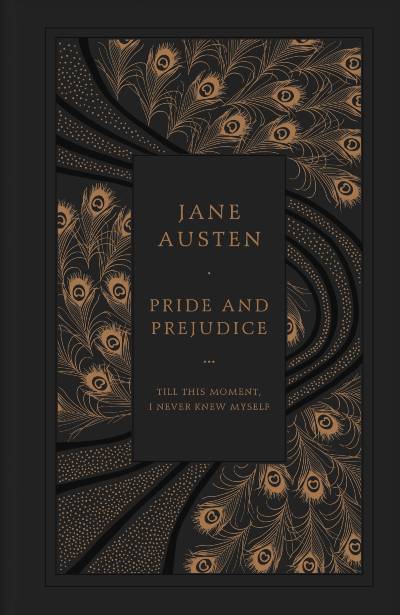
My favourite of Austen’s books is Pride and Prejudice, but with Emma almost too close to call. With both books, there is such a range of comic characters and tales of personal growth to learn from, but at the heart of each pulses a romantic love story that always sweeps me away, no matter how many times I read it.
I always recommend Pride and Prejudice to newbies because it’s the funniest and the most accessible. It also has, in Elizabeth Bennet, the greatest female character in all of literature. I defy anyone who meets her on the page to not want to immediately be her friend. And in Elizabeth’s love story with Darcy, Austen created the prototype for every hate-to-love romance that has come after. But it’s also a story about how different people need different things, and having compassion and understanding for that. Oh, and money: Austen is always about money and how the having or the lack of it impacts every choice we make, whether we consciously want to recognize that or not. This is a theme that all humans can relate to, no matter where or when they live.
Why do you think Jane Austen’s books resonate so much with readers?
I think Austen creates a world that is so self-contained and foreign to us that it works as an escape, and yet is just similar enough to capture—through her brilliant use of characterization—every human quirk and foible that we too would recognize in ourselves and our neighbours today. Consequently, when we step into her world, we can work through our own understanding of ourselves and others, and of the human condition in general. In this way, her writing is forever relatable, no matter when we come to it.
I also think that the very qualities of Austen’s work that can sometimes be criticized (the lack of historical context or physical detail, a quietness to the story, the omniscient narrative voice) all work in her favor when it comes to her timelessness. There is absolutely no grandstanding, no strategic playing to the reader of the time. Austen cared about her audience as much as anyone, but I think she cared about winning them over in a pretty lofty and lasting way: by appealing to all of our better selves. I think we simply feel better about our own chances for growth and happiness, and about the ways in which we can support and even lift each other up, when we read these books and see such recognizable and flawed characters do the same.
What message do you hope readers will take with them after reading The Jane Austen Society?
It’s very simple, in a way, and it’s set out near the end of the book: that sometimes it feels like everything we are holding onto in life has been stripped away, or lost, and that hope is all we are left with. But that sometimes—and I am living proof of this—hope can also be just enough. The key thing is not to give up, but to do the absolute minimum you can to keep moving forward—whether that be by reaching out to a new experience or new person in your life, or even something as simple as trying a new type of book, or joining a new book club! One never knows where anything might end up leading to in life, but the only way to get there is to keep moving forward.
Do you plan on writing another book?
Yes, definitely—in fact, I am working on one now. It too is historical fiction, but this time set in 1950s London, in a bookshop. That’s all I can say for now, but I suspect fans of The Jane Austen Society will not be disappointed when they learn more, which will hopefully be soon.
Official Book Blurb of The Jane Austen Society By Natalie Jenner
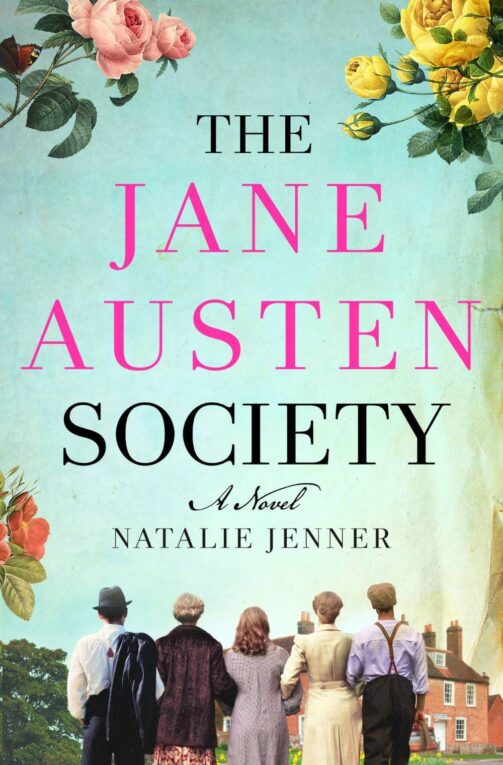
Just after the Second World War, in the small English village of Chawton, an unusual but like-minded group of people band together to attempt something remarkable.
One hundred and fifty years ago, Chawton was the final home of Jane Austen, one of England’s finest novelists. Now it’s home to a few distant relatives and their diminishing estate. With the last bit of Austen’s legacy threatened, a group of disparate individuals come together to preserve both Jane Austen’s home and her legacy. These people—a laborer, a young widow, the local doctor, and a movie star, among others—could not be more different and yet they are united in their love for the works and words of Austen. As each of them endures their own quiet struggle with loss and trauma, some from the recent war, others from more distant tragedies, they rally together to create the Jane Austen Society.
You can find out more about The Jane Austen Society by reading our book review. You can also check out our first book club reveal with more details (and a video introduction from Natalie Jenner!) HERE.
Join The Silver Petticoat Book Club
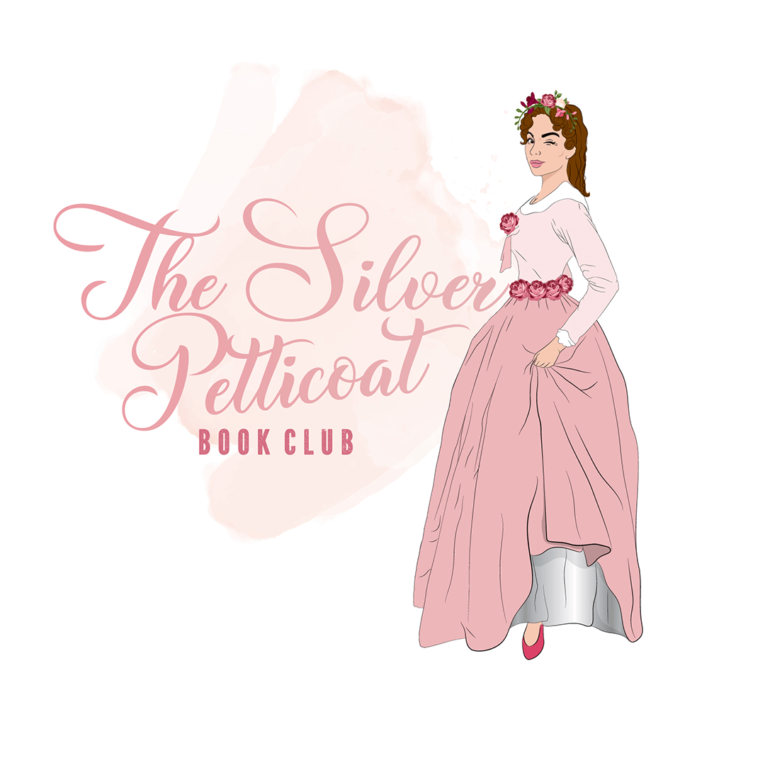
You can join The Silver Petticoat Book Club on Facebook, Instagram, or Goodreads! (Follow the hashtag: #TheSilverPetticoatBookClub) Read more details on the book club HERE. We can’t wait to see you there.
Have you read The Jane Austen Society by Natalie Jenner? Did you enjoy it? Who would you cast in a film adaptation? Have you joined The Silver Petticoat Book Club? Discuss below.
